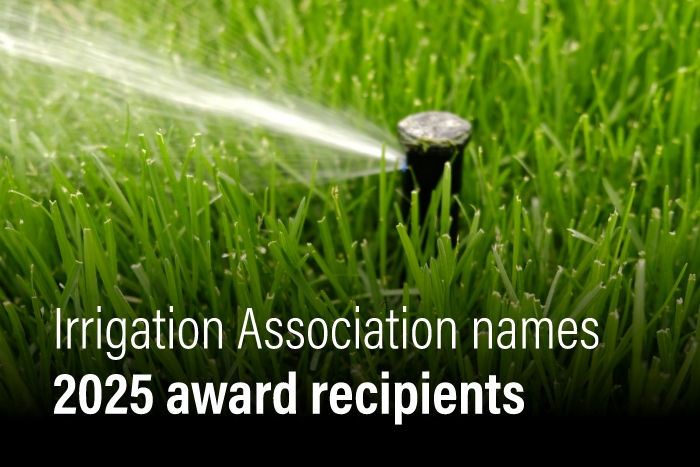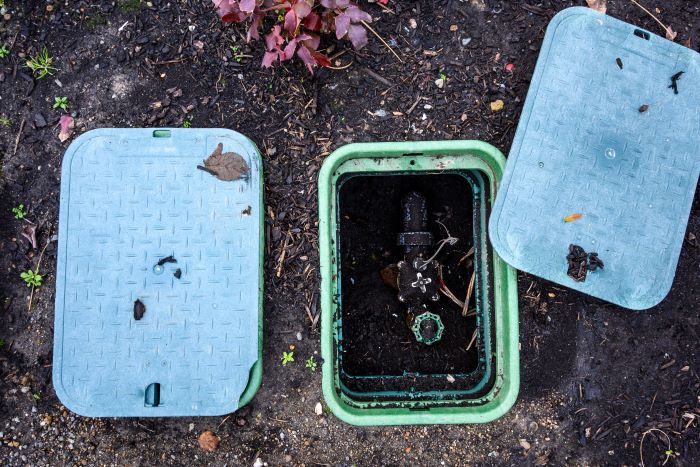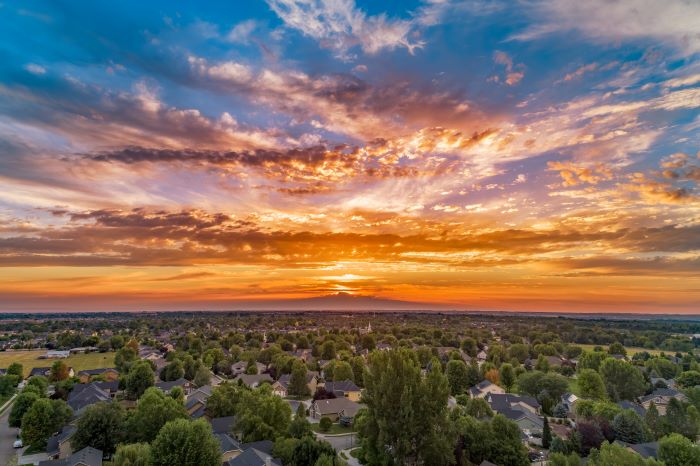As summer approaches, irrigation professionals around the country are in demand with calls to update, repair and activate irrigation systems ahead of the summer heat. In Wichita, Kansas, irrigation professionals are dealing with the typical seasonal rush, but they are also navigating the additional challenge of drought conditions throughout the region.
“We had an unseasonably warm and dry winter, and this spring everyone wants their irrigation on earlier,” says Jeff Baker, owner of The Grounds Guys of East Wichita. “We are getting endless phone calls to turn on systems as soon as possible because of the drought conditions.”
The dry conditions carry more significant implications for irrigation professionals in the Wichita area than just receiving earlier and more frequent calls for system activation or installation. These Wichita-based irrigation professionals share how the warm winter, lack of rainfall and dryer-than-usual spring are changing the way they do business.
Increased demand
While Ryan Lawn & Tree, headquartered in Merriam, Kansas, typically activates systems on a steady schedule between March and May, this year the calls have come much earlier as customers enter panic mode due to extra crispy grass well before the height of the summer heat.
“We are finding that the guys we have on staff are working six days a week, 60 hours a week,” says Anthony Crone, Wichita irrigation department manager for Ryan Lawn & Tree. “We are getting stressed and having to hire when we don’t normally need to. We are in the process of not only trying to make the guys more efficient during the day, but we need to bring on more people to get to the clients in time.”
If the dry conditions continue, the late summer slowdown that’s been typical in years past won’t be so slow at all. Anthony says he is working to add two to three more technicians to his current team of 15 in an attempt to prepare for the constant workflow he anticipates.
“Normally, you see a high volume of work in the spring and early summer and then around July and August, it tends to taper off before it ticks back up,” he says. “Last year we didn’t see any of that slowdown at all. We are trying to get ahead of the curve to make sure we are extra staffed to be prepared for the workload.”
Introducing new technology
Navigating the drought translates to bridging the gap between the lack of rainfall and maintaining a green yard. Luckily, irrigation technology is consistently improving. Retrofitting existing irrigation systems with modern technology and installing new, smarter and more technologically advanced systems are key ways of filling that gap.

“As an irrigation contractor there is an opportunity to fine tune or revise existing irrigation systems using newer technology,” says Jeff Brown, vice president of Tree Top Nursery and Landscaping in Wichita. “We have new sensors available to us that measure soil moisture and shut sprinkler systems off based on the level the homeowner or contractor has preset to shut off. Many homeowners water more than what is necessary, or they run their systems too long where you have water waste from runoff. This helps consumers know better when this level has been met.”
Crone says that his team doesn’t just turn irrigation systems on. They also invest a considerable amount of time into educating customers on the basics of smart watering, while also introducing them to the newer smart technology that could enhance their systems, allowing them to save water and money.

“Some people have basic on/off timers, and we try to talk to them about a smart controller that calculates the weather and zone information such as soil, the type of grass, how much sun, how much shade and then comes up with the right amount of water. That’s versus people dumping a lot of water on hard clay, where the water runs off and the soil isn’t absorbing,” Crone says. “We really push smart watering and water efficiency to all our clients.”
Brown says he finds that his clients need a reminder of how to water wisely.
“We try to tell our customers to run their sprinklers early in the morning as that has the best chance to prevent evaporation and get a good soaking,” he says. “Many people think that watering more is better but that doesn’t establish a deep root system for the heat of the summer, and they wonder why their grass looks so bad.”
While some clients choose to stop watering during dry periods, Baker says his team is working to educate customers about maintaining a healthy lawn and landscape through a drought with the right combination of smart watering, fertilizers or nutrition and proper mowing.
“It’s going to require a little more of your attention to make sure those things are working in harmony than it would have five or 10 years ago,” he says. “It’s a lot more than running your sprinkler every day. We are having to adapt.”
While the conditions of brown, unsightly grass, drooping plant material and cracked, dusty earth that a drought can create are inconvenient and unwelcome, Baker says there is a bright side, especially as people around the world begin to realize that water is not an endless commodity.
“I would say it is transforming our industry through necessity,” he says. “Our industry is becoming smarter, better, more regulated and more licensed due to drought conditions, forcing our industry to up our game to the next level. We are going through a transformational period. The drought has kind of highlighted that we are lagging behind. Responsible usage is coming to the homeowner’s front door, and it can be a good thing.”
Overcoming challenges
While there are currently no water restrictions in place in Wichita, Baker says he’s noticed that more and more municipalities are implementing licensing and regulatory requirements for contractors to ensure that the most qualified professionals are working on irrigation systems.
“There is getting to be more regulation when it comes to irrigation systems connected to the municipal water supply to ensure that licensed irrigators are the ones who are touching the sprinkler system,” he says. “There is more licensing and more regulation from city governments as they’re realizing that water is not an endless resource. As the resource becomes more scarce, the barrier to entry goes up to make sure people are getting the best results.”
Crone says he recalls a time several years ago when the city gave rebates for smart controllers. Should that happen again, he says his team will reach out to existing customers to promote the offer.
While irrigation technology is evolving and is well-suited to keeping lawns green and healthy, even in times of drought, irrigation contractors still face resistance as they speak with clients about system enhancements and upgrades.
 “It is sometimes challenging to convince homeowners that they will see a return on their investment if they update their sprinkler system to be more efficient and use less water even if they don’t switch to a warm season or lower water use turf or change their landscaping,” Brown says. “I think in 10 or 20 years, or maybe sooner, we will look at water differently as it becomes a more precious resource such as what you hear about in California. But there are a lot of easy and inexpensive ways to drastically cut down what we are using now without changing much. I think it starts with educating consumers to the fact that you can have beautiful yards and landscaping using less water. Sometimes change is scary but sometimes that is where our best ideas come from.”
“It is sometimes challenging to convince homeowners that they will see a return on their investment if they update their sprinkler system to be more efficient and use less water even if they don’t switch to a warm season or lower water use turf or change their landscaping,” Brown says. “I think in 10 or 20 years, or maybe sooner, we will look at water differently as it becomes a more precious resource such as what you hear about in California. But there are a lot of easy and inexpensive ways to drastically cut down what we are using now without changing much. I think it starts with educating consumers to the fact that you can have beautiful yards and landscaping using less water. Sometimes change is scary but sometimes that is where our best ideas come from.”
Fescue grass, which is not native to Kansas, is a popular choice in Wichita, and maintaining its green and healthy appearance demands a significant amount of irrigation and chemical applications. In addition to educating customers about smart watering, Brown says he shares alternative ideas with customers who are looking to conserve water while maintaining a green yard.
“Some are opting for a warm season grass such as Buffalo, but many of the HOAs around here have fescue as a requirement in their covenants,” he says. “I have seen that start to change as I have completed landscape projects in neighborhoods that have buffalo or Bermuda grass as well as native grass and native grass/wildflower mix. We have even installed more artificial turf in the last year than ever before. Artificial turf has come a long way in the last few years from looking like AstroTurf or a sports field to a taller grass with dead thatch and a more natural look.”
Should the drought continue in Wichita, water restrictions are a possibility in the future. That’s another consideration for irrigation professionals as they work to service their book of business.
“If we go on water restrictions, there will be a lot of customers who will want us to come out and set their controllers accordingly,” Crone says. “I would imagine we would have to make on-site visits again for the majority of our customers, which would be an extra service.”
In the worst-case scenario, Wichita residents could stop watering as the drought continues.
“There’s always the risk that people stop watering, and that would not bode well for our business or for any other irrigation business,” Crone says. “We want to continue to educate our customers. Even if we do go on water restrictions, with the right scheduling and efficient watering, we can try to save as many lawns as we can.”





